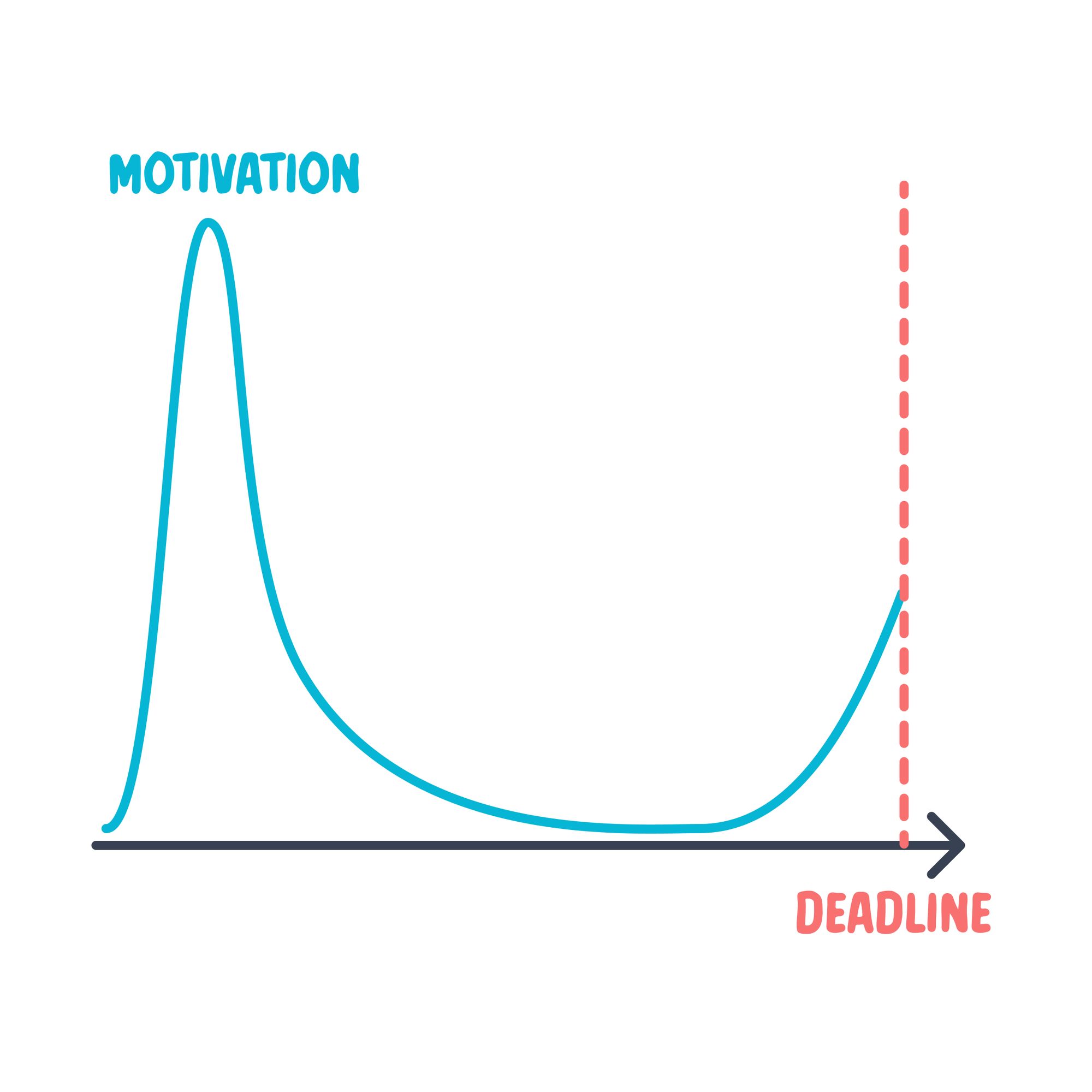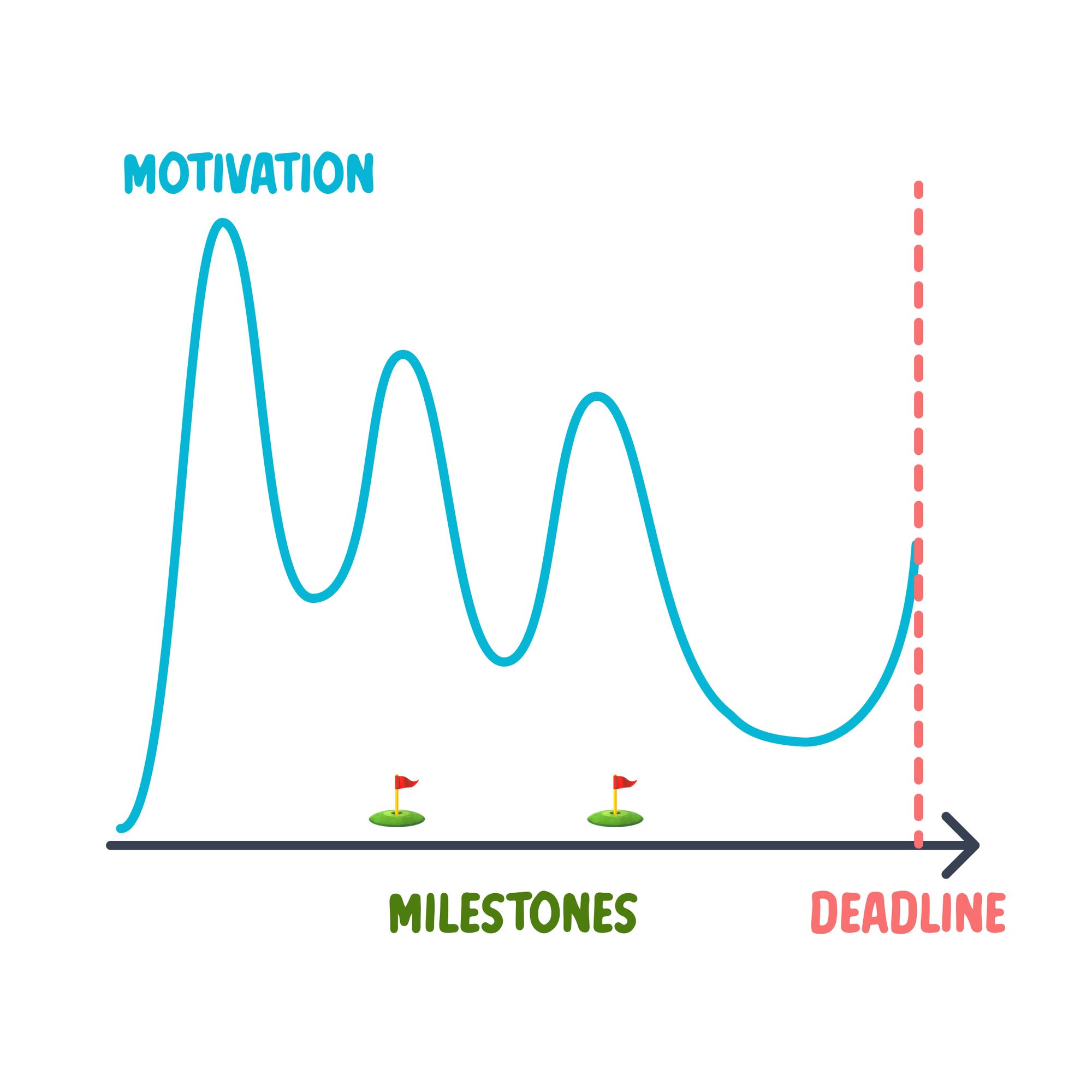The secret to staying motivated and reaching your goals

We've all experienced that moment when we're halfway through a book, a fitness program, or a project for work, when suddenly our motivation starts to dwindle. It's a frustrating and all-too-common experience that I like to refer to as "the problem of the middle".
Naturally, motivation runs high at both the beginning and the end of every time-constrained undertaking. The start of a project is a fresh and exciting phase filled with anticipation and enthusiasm. We get excited to envision endless possibilities and set ambitious goals. Our progress is often fastest and most easily noticeable at the start, allowing us to experience an immediate sense of accomplishment and positive feedback for our efforts.
As we near the end of a project, motivation picks up again. With the finish line in sight, the completion of our work becomes tangible, and we are able to envision the upcoming satisfaction of achieving our goal. The prospect of completion provides the last surge of motivation we need to stay focused and power through any remaining challenges that arise.

It's the middle phase that presents the real problem. At some point in the middle of this process, our motivation is bound to hit a roadblock and drop precipitously. In the middle, we're past the point of celebrating initial progress and the distance remaining starts to feel like a long and hard road ahead. To make things even worse, a number of other obstacles may rear their ugly heads:
- Burnout: Dedicating our energy to a specific project for a prolonged period of time can drain our mental and physical resources. When we don't take action to prioritize self-care and recovery, staying in "hustle" mode for too long can result in exhaustion and burnout.
- Lack of novelty: Whether you're pursuing a fitness-related goal or work-related goal, the daily actions that lead to success can feel repetitive over time. You may find yourself having to repeat the same monotonous workouts or run the same monotonous check in meetings. You may go through stretches of time when there are no clear indicators of progress. This often dampens our excitement and engagement.
- Distractions: Life happens. You may intend to prioritize a certain goal in your life, but your crying toddler sure doesn't care. Urgent issues in our personal lives seemingly arise out of nowhere and divert attention away from our intended priorities.

For these reasons among others, it is common for motivation to drop during the middle phase of any project. This can easily leave us feeling stagnant and discouraged. The good news is that there is one way to avoid getting trapped in the abyss of a long middle phase.
Define milestones to break up the middle phase.
The secret is breaking up the long middle phase into several short phases by introducing intermediate milestones to your plan.

To make this discussion more concrete, let's use a year of marathon training as an example. Let's say that we have a casual runner who decides in January that they want to run a marathon in December. That is 12 whole months between the start and end of their training cycle.
A naive approach to this goal would be simply going out on runs and then continually making those runs longer or harder or more frequent as time goes by. This may be a fine way to progress for a beginner, but it's far from ideal. Chances are, by the time March rolls around, their motivation to lace up their running shoes will be at an all time low. The runner may be dealing with exhaustion or boredom from the monotony of their workouts at this time. Or perhaps external pressures from work and family commitments have started to interfere with the time and energy they initially expected to be available for running.
They may take a look at their calendar and wonder, "How in the world am I going to hang on for another 9 months?" The problem is that this runner's goal race is so far in the future that their motivation to work towards it will decline long before they get there.


A much more effective approach would be to break up their big goal into several shorter phases, each with a specific milestone at the end. Several options for our runner are:
- Register for a series of shorter races leading up to the marathon, such as 10Ks and half marathons. Every couple of months, use one of these shorter races as a test to measure improvement in aerobic fitness.
- Set intermediate goals for increases in weekly mileage. For instance, if they are starting by running 20 miles per week, they can try to get that up to 30 miles per week by a certain date, and progress from there.
- Set a specific date a few months out for a solo "time trial", in which they run a certain distance (e.g. 10 miles, half marathon, etc) at the fastest pace possible. This is a way to manufacture a "race day" environment with lower stakes involved.
By establishing a target any time from a few weeks to a few months out, our runner can have something more manageable to work toward that is squarely within their reach. This bolsters their motivation by giving them something to focus on with a deadline that is not too far ahead. Having a milestone to aim for creates excitement and challenge around the process, and serves as an opportunity to celebrate progress along the way.

If you are working towards a big goal, try to break it down into chunks that are more manageable in size, each associated with a specific deadline. Breaking up your middle phase with intermediary milestones is a powerful strategy that sets you up for success. Defining specific checkpoints, introducing fresh challenges, and celebrating milestones are key components to providing a sense of accomplishment and reigniting motivation when the going gets tough.

